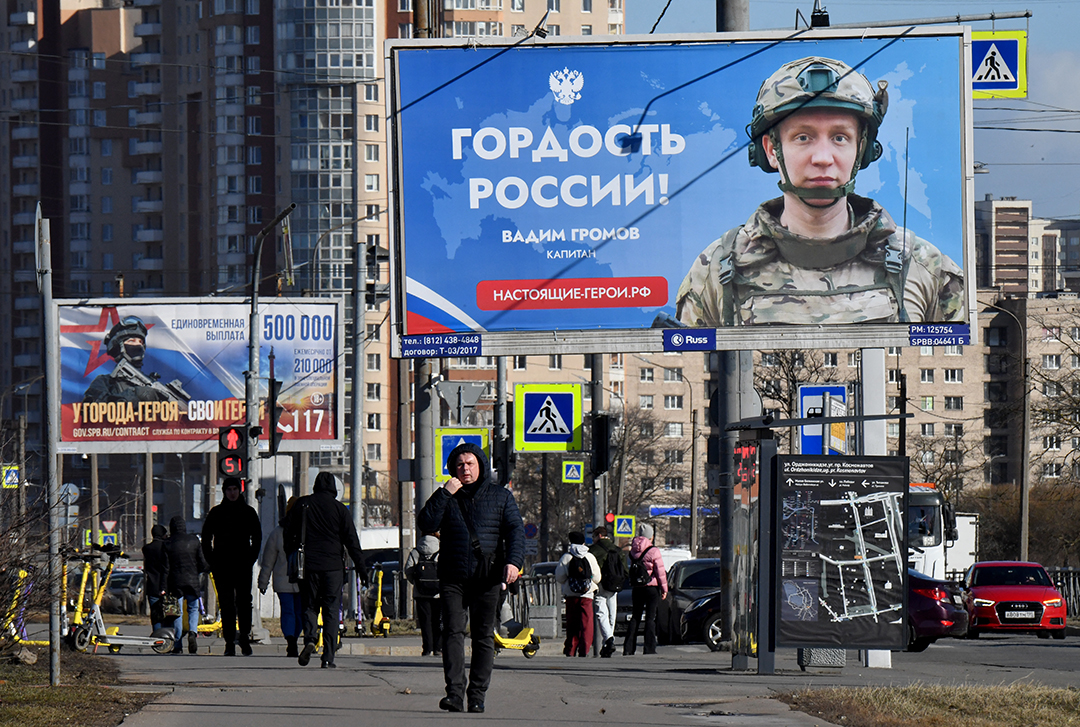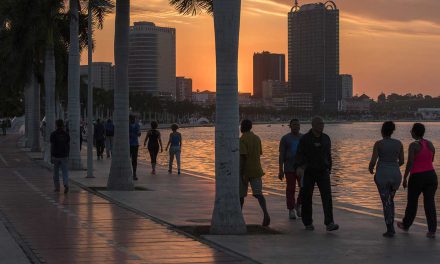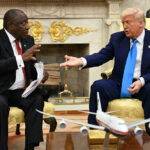The idea of “peace through strength” is dominating the spotlight, as British Prime Minister Keir Starmer recently said any peace deal between Russia and Ukraine “must be backed by strength” – that is, Europe throwing its full weight behind Ukraine. US Defence Secretary Pete Hegseth said “those who long for peace must prepare for war”.
Yet this philosophy has drenched the world in blood.
Andrew Bacevich defined it as a “belief in the efficacy of military power”. It is part of a prevailing school of realist (realpolitik) thought that holds the view that international relations are a struggle for power among self-interested states, conflict is inevitable, and military strength and security are paramount.
However, Bacevich lamented that “peace through strength” has become “peace through war”.
Historians trace the “peace through strength” (PTS) concept to the Roman Emperor Hadrian, who lived in the second century AD and is known for securing the empire’s borders with walls, watchtowers, and fortresses, maintaining a strong military presence to deter potential threats. Hadrian sought peace through strength or, failing that, peace through threat.
The first US president, George Washington, revived the idea in his 1793 address to Congress, saying that “if we desire to secure peace, one of the most powerful instruments of our rising prosperity, it must be known that we are at all times ready for war.”
Another US president, Ronald Reagan, invoked and reinforced the idea in 1986 when he said that “we know that peace is the condition under which mankind was meant to flourish. Yet peace does not exist of its own will.”
From Russia’s invasion of Ukraine (which was itself a misguided use of force) and everything that has happened in that war until now, we have witnessed the failure of “peace through strength”.
Far from being silenced by a show of strength, the power of guns and the effectiveness of military equipment and technological advances, warmongering reigns because global and regional leaders have little or insufficient appetite for real peace. Whatever little appetite for peace there is has little influence and ability through which to attain it.

People walk past billboards honouring a Russian serviceman (front) and promoting contract army service in Saint Petersburg on March 19, 2025. (Photo by Olga MALTSEVA / AFP)
The best modern illustration of this is the recent post on X in which European Union president Ursula Von der Leyen announced a programme called “ReArm Europe”, calling it “a plan for a safer and resilient Europe”.
As if not to be outdone, former Russian president Dmitry Medvedev has also been beating the drums of war, saying Russia’s task remains to inflict “maximum defeat” on Ukraine. It is a futile attempt to silence guns by firing guns.
There are five problems with the idea of “peace through strength” in our geopolitical architecture:
- To feel strong, countries are incentivised to procure more lethal and technologically advanced arms. This can create a kind of arms race, as we saw during the Cold War;
- Huge sums of money that could be spent on human development are diverted towards military expenditure, as highlighted in a Financial Times article by Janan Ganesh titled “Europe must trim its welfare state to build a warfare state”;
- Military-industrial complexes are created to continually feed the desire for arms in order to make more profit;
- Smaller and weaker countries feel the need to gravitate towards countries with more military prowess, thus creating further cleavages in our global systems; and
- The so-called international rules-based system, which has built-in mechanisms to mitigate conflicts, deter wars, and resolve problems, is rendered powerless against the overwhelming might of the most armed countries. Bono is reported to have made the point at a U2 concert many years back that the five permanent members of the United Nations Security Council (UNSC) are also the world’s five biggest arms traders. This makes it extremely difficult for international mechanisms like the UNSC to work when three of them—China, the US, and Russia—are serious aggressors.
“Peace through strength” has not worked because it has become peace through war. An alternative school of thought in international relations – liberalism – posits that conflict is not inevitable and can be mitigated through institutions, economic interdependence, democratic governance and diplomacy.
As my colleague Stephen Buchanan-Clarke, who heads Good Governance Africa’s Human Security and Climate Change programme, stated in our interaction on this issue, effective conflict prevention and resolution can balance both schools of thought.
For example, international trade, humanitarian law, diplomacy and the spread of liberal democratic norms have likely contributed to a decline in the frequency of interstate conflict since World War 2, and made almost all forms of conflict less deadly.
That said, the problem remains that sometimes, these alone are just not enough of a deterrent against bad actors. This is where force as a deterrent or “peace through strength” in a diplomatic framing comes in.
For example, in 1962, after the US discovered Soviet nuclear missiles being installed in Cuba, leading to a 13-day standoff between the US and the Soviet Union, President John F Kennedy used a combination of military strength and diplomatic negotiation to resolve the crisis.
But an even better framework must take root in addressing our geopolitical conflicts and problems. It is the philosophy of nonviolence as proposed and promoted by luminaries such as Mahatma Gandhi, Martin Luther King Jnr and Nelson Mandela.
Mandela went on an intellectual journey in this respect from when he was utterly convinced before the Rivonia Trial that violence was a necessary evil for attaining justice because peaceful protest had hitherto proved futile. Hence, the establishment of uMkhonto weSizwe was an important part of the struggle to end apartheid.
But in the end, all these leaders used the nonviolence philosophy effectively to lead the struggles of their people against colonial rule, racism and apartheid oppression.
This approach was rooted in the belief that peaceful methods—such as negotiations, diplomacy, and non-cooperation—could bring about social and political change without resorting to violence. Their legacies continue to inspire movements for civil rights and social justice around the world, proving that peace can be achieved through peaceful means rather than through force or coercion.
The desire to address global problems such as poverty will always be made subservient to the projection of power by those with military means. We need leaders with a new philosophy of peace through peace.
War has not helped our world, and it never will. Generation after generation will be maimed, dispossessed and killed, creating feelings of revenge and hatred.
It has to stop somewhere. We need to root out the idea of “peace through strength” because it has not worked sustainably. Nations that invest in war will reap their return on investment in war.
As such, those with powerful armies will continue to throw their weight around and do whatever they like. This is unsustainable in a violent, unequal, and poverty-stricken world such as ours.
The system of inequality will remain because it is maintained by the hegemony of the powerful.
- Good Governance Africa is actively pursuing peace through its participation in the Peacemaking Advisory Group, a nonpartisan platform for consultation between critical stakeholders working to de-escalate intercommunal tensions in Cabo Delgado Province in Mozambique.
- This article first appeared in Daily Maverick.
Lonwabo Patrick Kulati is the Chief Executive Officer of Good Governance Africa’s (GGA) Southern Africa Regional Office (SARO). He has a strong history of leading international NGOs and driving organisational growth, effectiveness and profitability. He also has expertise in strategy development and execution, leadership coaching, fund development, stakeholder management, advocacy and partnership cultivation. Patrick is also a published author of "A Gap in the Cloud," providing valuable insights and inspiration on personal and leadership resilience. He holds a Master’s degree in Public Administration from the University of Stellenbosch.













